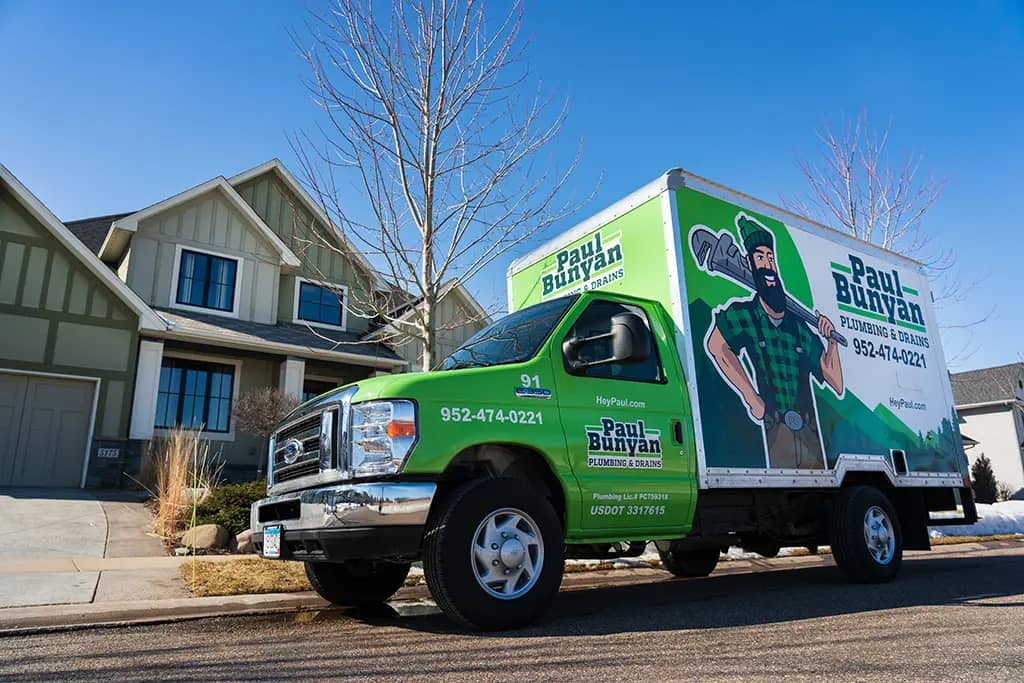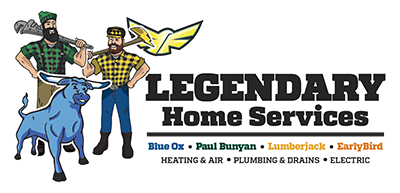Most of us take water for granted. We expect to turn on the taps in our home at any time and have an immediate and unending supply of free flowing water. It’s only when that supply is interrupted for some reason that we realize just how important effective functional plumbing and a constant water supply is to the quality of everyday domestic life.
Plumbing infrastructure is complex, with many moving parts situated in a range of locations. Trying to fix a problem that compromises your water supply can be tricky. Tasks such as water line repair, which can involve excavation both inside and outside of the home, or investigation in cramped locations with multiple points of entry is not really appropriate for DIYers, no matter their confidence level. This type of domestic chore is best left to the professionals.
For water line repair in Minneapolis, MN, the plumbing experts at Paul Bunyan Plumbing & Drains should be every home owner’s go-to resource. Their experienced team can investigate, perform diagnostics, troubleshoot, and replace or repair broken parts safely and with as little household inconvenience as possible. When it comes to water line repair, a professional has the broad-based knowledge necessary for assessing a problem that potentially has a myriad of sources.
Water Line Supply – What is it?
Water line supply refers to the system of many pipes, both rigid and flexible, that carry water into and out of your home from a dug well or municipal mainline. The main supply line is buried underneath the property, to protect it and so it won’t freeze, and it runs from the ground into the home through a series of junctions and smaller pipelines. As it begins the journey through the interior of your home, the water supply line splits into cold water lines and hot water – which passes through your home’s water heater. More flexible water supply lines attach to sinks, toilets, and other fixtures that distribute water. Of this type of line, make a note that hot water lines take more of a beating than cold water and thus may need to be swapped out more frequently.
Supply lines are typically made of PVC plastic, sometimes reinforced with mesh, galvanized iron, or copper. Older piping systems that carry water were often made from lead. Obviously, if such pipes are still in situ, they need to be replaced for health reasons.
The flexible supply tubes that are closest to the taps or other means of water distribution should never be connected directly to a water supply pipe, but should connect to a shutoff valve that is attached to the water supply pipe. This is to compartmentalize the system and provide a means for limiting damage in case of a problem.
Signs Your Plumbing Needs Maintenance or Repair
It’s fairly obvious when there is a problem with one of your home’s water supply lines. Remember those taps and the endless stream of free flowing water? It suddenly stops and that is enough to cause anyone concern. But the following indicators also require immediate action and a call to a water line repair specialist. It’s important to address water supply line issues before they become even more serious and cause extensive damage to foundations or other structural features.
- Leaks can be obvious or not. Water supply lines can sprout pinhole leaks that are hard to detect, but that lead to diminished water pressure and damage over time. Larger leaks may be caused by damaged pipes, tree roots intrusion, or excavation mishaps.
- Unusually low water pressure is almost always a sign that something is not right. It could mean a leak somewhere along the line, or a disconnected joint or some other kind of disruption. It is also the type of problem that can occur in a dwelling with multiple units, or if there is a problem at the supply source, but it can take a professional to identify the issue quickly and completely.
- Soggy patches in the backyard, potholes in the driveway, or sinkholes anywhere can point to a problem in the main water lines leading into your home. If they sprout a leak, the water can slowly saturate the ground, destabilizing it.
- Rusty looking or foul smelling water may be another sign that something is off with water supply lines. Lines may be compromised, with water standing rather than running freely, or metal pipes corroding and contaminating the water supply. No matter the source, dirty or smelly water issuing from taps should not be ignored.
- Higher than usual water bills is almost always a solid clue that water is leaking somewhere along the plumbing pipeline. Such leaks can hit the pocketbook hard, as well as cause huge damage, so getting a professional in to assess the problem and perform a water line repair if necessary should be a priority.
- Unexplained warm or damp patches on the basement floor can indicate a leak within the hot water side of your water supply. But get a pro to assess the possibility before breaking up that cement floor to investigate. They should be able to use specialized equipment to investigate the hot spot without excavating, and then do a very targeted dig if needed.
Rerouting or Replacing Water Lines
Depending on the situation, water supply lines may need to be re-routed or replaced. Re-routing options may be necessary in an area of new development, or if you are adding a bathroom or addition to your home. Any change in plumbing infrastructure may require re-routing water lines, even if it’s for something as simple as avoiding tree roots.
If lines weren’t buried deeply enough in the first place, or if they have been impacted by construction, disturbances in the earth or other circumstances, they may need to be completely replaced. In areas of older homes, water supply lines may be made from obsolete and potentially hazardous materials such as lead. If that’s the case, you’d be wise to get the whole system assessed and lines made from modern materials installed.
This may prove costly, but if a system fails it will need to be replaced anyway, and additional damage dealt with as well. And in the case of lead or corroded iron pipes, your family’s health and well being may be at stake.
The thin flexible water supply lines that run from larger lines to taps or faucets will be much easier to re-route or replace. Some may be located behind walls or under floors, but a professional water line repair technician will be able to make the change with minimal destruction and patching.
Water Supply and Trenchless Technology
As the name suggests, trenchless technology is all about avoiding digging trenches. It is a welcome innovation in construction that can apply to plumbing and water line repair as well. More and more utility contractors are using trenchless technology to service water mains and other underground infrastructure without major excavation.
The same principles can apply to the buried water lines around your home. Rather than dig up the driveway or yard, a qualified technician can conduct the requisite diagnostics via video-camera, and then use a directional drill to reach the site of the problem.
In some instances, new piping can be threaded through the old, eliminating the need for digging up and replacing the pipes.
Some of the new trenchless technologies currently in use are horizontal directional drilling (called HDD), microtunneling, horizontal auger boring (orHAB), pipe ramming and jacking. Your water line repair specialist may not use all of these methods, but will likely have at least one, or something equivalent, in his toolkit.
How Much Will It Cost?
Because plumbing costs, including water line repair, can vary greatly, it is best to get an estimate for anything but emergency work. A certified plumbing specialist will be able to give a fairly accurate break-down of the costs involved for water line repair or replacement. Any job that requires excavation or breaking walls and floors will cost substantially more. A simple flexible water line replacement should be relatively inexpensive with minimal material costs and labour. If your plumbing job is large, always seek multiple estimates from only certified contractors and trusted plumbing service providers. Most reputable plumbers will happily supply a free quote.
Why You Need a Water Line Repair Professional
As mentioned previously, plumbing is not ideal as a DIY pursuit. Too often, an unskilled homeowner can make matters much worse by attempting water line repairs or replacement with the help of a YouTube video. Serious damage can be done. Here are five good reasons why it’s worth your time to call in a water line repair specialist:
- The specialized knowledge and equipment plumbers bring with them to a job is invaluable. From diagnostic tools to directional drills and video cameras, the modern plumber’s arsenal would be hard to replicate at the local hardware store. A professional can get the right work done quickly and safely with the correct tools, and back up their work with a guarantee.
- Saving money in the long run. Do you need any other reason? A certified plumber can spot small problems that may be looming and head them off before they become big ones.
- Water lines that are regularly inspected, kept in good condition and made from modern materials will add to the value of your property. The minimal cost of a water line repair or replacement is a small price to pay for a better resale price if you chose to sell your home.
- In instances where municipal water mains, insurance claims or civil suits around damage are involved, you definitely want a certified plumber and thorough documentation in your corner.
- Minimal downtime. Don’t embark on a DIY journey that might turn into a never ending nightmare for you and your family end. Call in a professional water line repair plumber to ensure that the water continues to flow in your household without undue delays.
Safety Protocols for Plumbers and Customers
In the era of COVID-19 the way we all do business has changed. New protocols are necessary when service providers enter private homes to perform water line repairs and other types of work. This is to keep everyone safe, both contractor and customer. Be aware that there are things you can do to prepare your home for a visit from a water line repair specialist.
Most importantly, book your appointment ahead of time so you have time to prepare. If it’s not an emergency, expect to have to wait a bit longer than usual for service. There are backlogs in every industry, and new protocols can slow down service. Once you have your appointment, do what you can to prepare.
For example, you can ensure that household members stay out of the contractor’s way. And respect physical distance rules, even if you wish to watch the work being conducted. Clear a path through your home so they will have minimal surfaces to touch. And although they are likely to be carrying their own hand sanitizer, ensure that there is somewhere the contractor can thoroughly wash their hands.
On the plumber’s side, many contractors now travel with plastic sheeting that can help isolate the work area. They’ll likely call ahead to be sure you are ready for them. And they may conduct more business (such as invoicing, etc.) via phone or email. They will have disinfecting protocols for their tools and you can feel free to ask about them.
With a little cooperation on both sides, even the most complicated water line repair work can be conducted quickly, effectively, and most importantly – safely.
If you are a homeowner in the Minneapolis, MN area and know, or suspect, that you might have a water supply line issue, don’t hesitate to get in touch with the plumbing experts at Paul Bunyan Plumbing & Drains for professional water line repair and more. They’ll get your water running freely again in no time.


